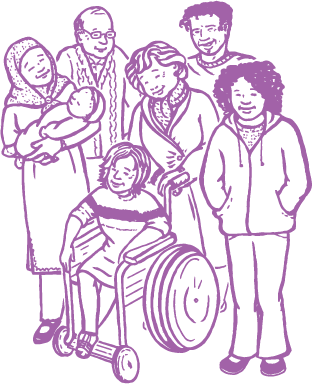Comprehensive Sexuality Education for students with disability
Students with disability often don't receive adequate comprehensive sexuality education (CSE). They may have fewer opportunities to engage in learning moments due to limited social opportunities and challenges in accessing and processing information independently. These children and young people experience higher rates of sexual abuse and exploitation and are more susceptible to poor relationships and sexual health outcomes.
Bookings
The True All School program is offered Queensland-wide. Please contact our state-wide contact number with enquiries or to make a booking:(07) 3250 0280 or schools@true.org.au.
Ensuring curriculum access for students with disability
While many students with disability can access the national curriculum and achievement standards for their year level, it is acknowledged that reasonable adjustments may need to be made for some students. Student learning needs are met by modifying and contextualising the educational experience.
For students with individual curriculum plans True works closely with teachers, parents/carers, and specialist support staff in building a program that is age and stage appropriate. This will be formulated in response to the identified needs for students in a group.
Learning outcomes
Learning skills that promote personal safety, including skills that enable students to engage in healthy relationships, are known to improve educational and social outcomes. Developing and practising these skills is a key component to personal well being and enhanced community capacity. It also leads to increased:
- Personal safety skills, including safety networks
- Inclusion in education programs and the community at large
- Communication, decision making and relationship skills
- Healthy and appropriate social/sexual behaviours
- Understanding of the process of puberty, reproduction and birth
- Sexual health including safer sex practices and contraception
4 x 1-hour sessions are generally recommended for each developmental level (Exception: Junior Primary, which is 3 x 30-minute topics). Choose from the sessions A, B, C, D, and E listed below:
| Junior Primary |
Senior Primary |
A. Personal Safety
- Keeping safe from abuse and exploitation
- Learning the rules about touch
- Safety networks
- What to do if you don't feel safe
- The No-Go-Tell safety plan
B. Public and Private
- Public and private body parts, behaviours and places
C. Learning about feelings
- Identifying different types of feelings
- How to recognise when not feeling safe
|
A. Personal Safety
- Keeping safe from abuse and exploitation
- Learning about the rules of touch
- Safety networks
- What to do if you don't feel safe
- The No-Go-Tell safety plan
B. Public and Private
- Public and private body parts, behaviours and places
- Includes masturbation
C. Puberty and Body Changes
- Physical, social and emotional changes of puberty (what are they?)
- How to manage changes of puberty
- Personal hygiene
- Menstrual management
- Wet dreams
- Changing feelings
D. Healthy relationships
- Learning about different types of relationships
- What types of touch are ok in each type of relationship
|
Junior Secondary
A. Personal Safety
- Keeping safe from abuse and exploitation
- Learning about the rules of consent
- Safer use of social media, sexting etc.
- Safe dating
- Where/how to seek help
B. Public and Private
- Public and private body parts, behaviours and places
- Public and private online and in using social media
- Sex and the law
C. Puberty Refresher
- Revision of puberty topics for later developing students, and/or students who require further support with managing puberty.
D. Keeping sexually healthy
- Negotiation skills for partner relationships (and other relationships)
- Decision making and assertiveness skills
E. Healthy Relationships
- Identifying different types of relationships e.g. family, friends, teachers, acquaintances and the types of touch that are ok in each
- Where/how to seek help
|
Senior Secondary
A. Personal Safety
- Keeping safe from abuse and exploitation
- Learning about safe dating, safe partying, and rules about consent.
- Sex and the law
- Where/how to seek help
B. Public and Private
- Public and private body parts, behaviours and places
- Public and private online and in using social media
- Sex and the law
C. Keeping Sexually Healthy
- Sexual relationships
- Consent and safer sex
- Sex and the law
D. Healthy relationships
- Learning about the different types of relationships and what types of touch are ok in each.
- Includes sexual touch and consent
- Where/how to seek help
|
Key topics may be repeated but become taught at a more sophisticated level as children age. True recognises the importance of building on age/stage understandings and that reinforcement of key topics may be required for some students.
All education programs for students with disability include:
- Parent/Carer information letter for schools to use (provides information on sessions)
- Information brochure for the P and C community
- Fully developed interactive classroom activities, including question and answer sessions
- Support materials and hand outs
- All resources are reviewed annually, and are up-dated regularly
- True acknowledges diversity in relationships and families. True educators will provide facilitation that is respectful and free of discrimination.
Cost: For a quote, contact 3250 0280 or schools@true.org.au
Please note: In the interest of student safety, correct modelling of public/private, to ensure that students receive an interactive and meaningful session, it is not permitted to combine classes into larger groups. Teachers will be required to remain with their class throughout the session.
For booking details and enquiries, please contact 07 3250 0280.

Student education and professional development package
for only $550 +GST (valued at $3500)
Read more

